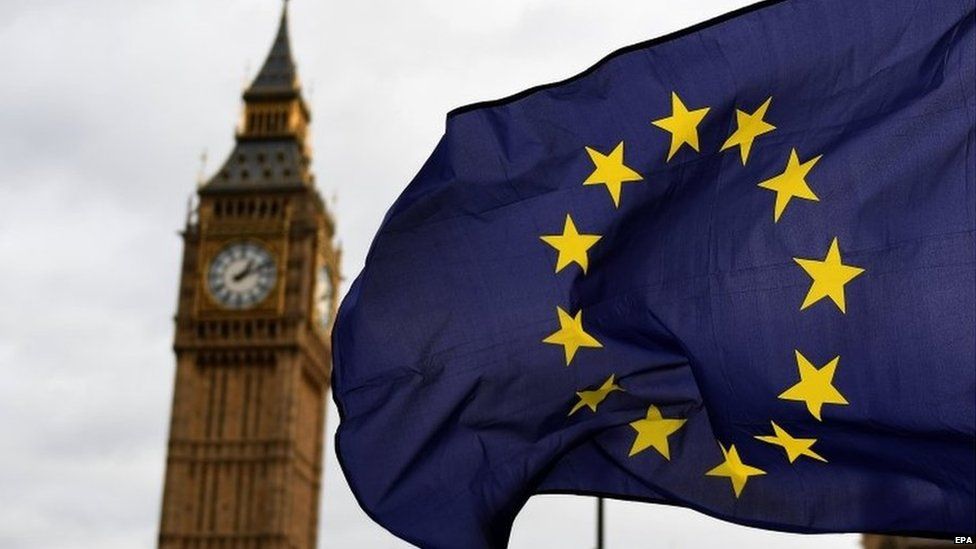Rudd offers fresh reassurance over status of EU nationals
- Published

An estimated 3 million EU nationals are resident in the UK
Ministers have sought to reassure peers about the status of EU citizens in the UK after Brexit as they face possible defeat over the issue in the Lords.
Home Secretary Amber Rudd has written to peers to say the UK cannot offer a unilateral guarantee on residency but it will be a priority once talks begin.
She also said peers would have a say on future changes to migration rules.
The Lords could inflict a defeat on the government when amendments to the Brexit bill are debated on Wednesday.
Earlier this month, MPs passed unamended a bill which would give Theresa May the power to begin the Brexit process.
They accepted assurances from ministers that protecting the rights of the 3 million EU nationals living in the UK would be a priority for ministers.
But many peers want the government to go further and state that all EU nationals lawfully in the UK at the time the UK exits the EU should be allowed to stay.
In a letter to peers, Ms Rudd said such a guarantee, however "well-intentioned", would not help the hundreds of thousands of UK citizens living on the Continent as it could leave them in potential limbo if reciprocal assurances were not given by the EU's 27 other member states.
Government facing defeat in Lords
BBC political editor Laura Kuenssberg
The letter is not that different to what was sent to MPs previously to try to ease their minds, as the Article 50 legislation made its way through the House of Commons.
It does though appear to kill off the idea that Theresa May will arbitrarily set a cut off date for EU immigration without having to get MPs or peers onside first. But it is unlikely to spare the government's blushes tomorrow. Without a further more dramatic concession, they are set to lose.
That will set in train the first 'ping' of the potential 'ping pong' - the Parliamentary process where the Lords reject something in the red chamber, sending it back down the corridors to the green benches - daring, imploring perhaps, backbenchers to join with them and push back at the government.
There is no sign at the moment that ministers want to budge on this issue
"We need to act fairly and provide certainty for both groups of people as quickly as possible and that will remain the government's position," she wrote.
She suggested the inability to reach a mutual agreement was more a question of timing than principle and the UK and EU had a "common goal" in doing so if, as expected, the UK notifies the EU of its intention to leave by the end of March.
"There is absolutely no question of treating EU citizens with anything other than the utmost respect," she wrote.
"That's why we will be making securing their status a priority as soon as we trigger Article 50 and the negotiations begin.
"I know some colleagues are concerned about how long this might take to resolve, but the government remains committed to providing reassurance to EU nationals here and UK nationals in the EU as a priority once Article 50 has been triggered."
The home secretary said EU nationals made a vital contribution to UK society
Ms Rudd said that any changes to the status of existing EU residents and those coming from Europe in future would have to be approved by Parliament.
"This will be done through a separate Immigration Bill and subsequent secondary legislation so nothing will change for any EU citizen, whether already resident in the UK or moving from the EU, without Parliament's approval."
She added: "This isn't just about ensuring British businesses and our public sector have access to the right workers.
"We owe it to those many European citizens who have contributed so much to this country to resolve this issue as soon as possible and give them the security they need to continue to contribute to this country."
Last week, peers gave an unopposed second reading to the European Union (Notification of Withdrawal) Bill.
But the government - which does not have a majority in the Lords - is potentially more vulnerable to defeat now that specific amendments are being discussed.
The Supreme Court ruled in January that the government requires the prior approval of both Houses of Parliament before it can trigger Article 50.
- Published26 February 2017
- Published7 February 2017